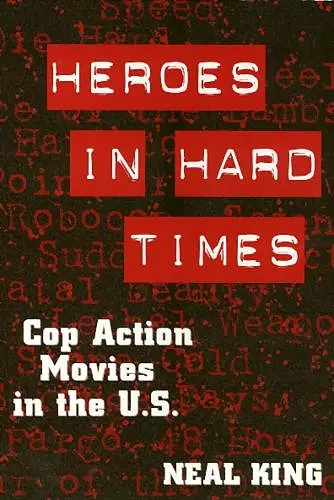Heroes In Hard Times
Format:Paperback
Publisher:Temple University Press,U.S.
Published:15th Jun '99
Currently unavailable, and unfortunately no date known when it will be back

An in-your-face look at the cop action movie genre
Discussing such topics as white male guilt and the rage of the oppressed and examining such films as "Lethal Weapon", "Die Hard", and "Silence of the Lambs", this book notes the socially-charged roles given to American culture's fictional police heroes.According to Neal King, cop action movies point both an accusatory finger and homoerotically murderous race at powerful white men. A close look at a massive and hugely popular fictional culture, Heroes in Hard Times considers the over 190 cop action movies released between 1980 and 1997; examines the generic moral logic that they offer; and explores the crisis in American masculinity that, King argues, propels the action in their stories. King studies how, in the cop action genre, working-class police officers weigh in on such topics as racial justice, homosexuality, misogyny, unemployment, worker resistance, affirmative action, drug use, poverty, divorce, and the use of violence to deal with social problems. Facing their enemies with wisecracks and firepower, these men prove themselves at once complicitous in a system of violence and corruption and worthy to \u0022blow away,\u0022 with neither hesitation nor remorse, their -- society's -- menacing threats. The central male figures in these stories are heroes in their fight against criminals, but, as individuals, they fell undervalued by women, unappreciated by their bosses, and out of place in a society where fat cats and liberals have all the power. Such \u0022hard times,\u0022 King's study reveals, position them to simultaneously long for, disdain, and heroically -- if violently -- stake their frustrated claim to white male privilege. Discussing such topics as white male guilt and the rage of the oppressed and examining such films as Lethal Weapon, Die Hard, and Silence of the Lambs, King's book notes the socially-charged roles given to American culture's fictional police heroes. The last artisan in a culture that has become increasingly corporate and bureaucratized, the movie cop is the last 'real man' in a world that has emasculated men and the last non-conforming patriot in a world that pays more attention to rules than what is morally right. A book that shows how modern mythology makes sense of rampant corruption (and provides entertainment in its punishment), Heroes in Hard Times will educate and provoke those interested in American popular culture, film, and gender studies.
"The cop-at least in cinematic fantasy-is America's last action hero, the last 'real man' in a world of emasculated wimps. In this discerningly analytic, yet erudite and even occasionally impish study, Neal King shows that such fantasies ignore the reality of real police work while offering a subterraneanhomoerotic thrill for both the character and his (male) viewer. A significant work that straddles the boundaries of cultural studies and sociology." -Michael Kimmel, author of Manhood in America "Neal King loves a good cop-action flick, and in Heroes in Hard Times: Cop Action Movies in the U.S., it shows. His obvious enthusiasm as a fan-"Whoa, good crash!"-lends an intensity to his scholarship. And like-minded readers will delight in snippets of hard-boiled dialogue from Die Hard, Sudden Impact, and many other films. But for all its pleasures of fandom, the book has a deeper purpose. The universe of cop-action films, Mr. King argues, acts as a "cracked mirror" of American society, reflecting in particular the anger, fantasies, and guilt of white men who feel they have "lost ground." It is, he says, a self-conscious reflection." -Chronicle of Higher Education "King's study is good to read. In fact, it might prove most enlightening to those of us who have tended to disdain this impoverished, headachey genre. In straight-talk prose. King takes account of the prejudices many readers will bring to his subject; certainly he can't be accused of sidestepping the toughest objections to these movies. In successive chapters he regards them through prisms of gender, race, and economics; the longest chapter is on the symbolism of sodomy...King does not defend cop action so much as seek thematic coherence from a position of sympathy." -Film Quarterly "King's analysis remains valuable for the contribution it makes in taking seriously an oft derided and dismissed form of popular culture that speaks directly to issues of masculinity... This book will be a useful resource for those interested in understanding how images of hyper-masculinity--the "hard man"--represent both the excess and the ordinary parts of masculinity in cinema. King's methodology is helpful in reading media texts, and his provocative interpretations of these films--particularly his readings of homosocial sadomasochism--will likely generate much discussion." -Women's Studies in Communication
ISBN: 9781566397025
Dimensions: 203mm x 127mm x 28mm
Weight: unknown
282 pages